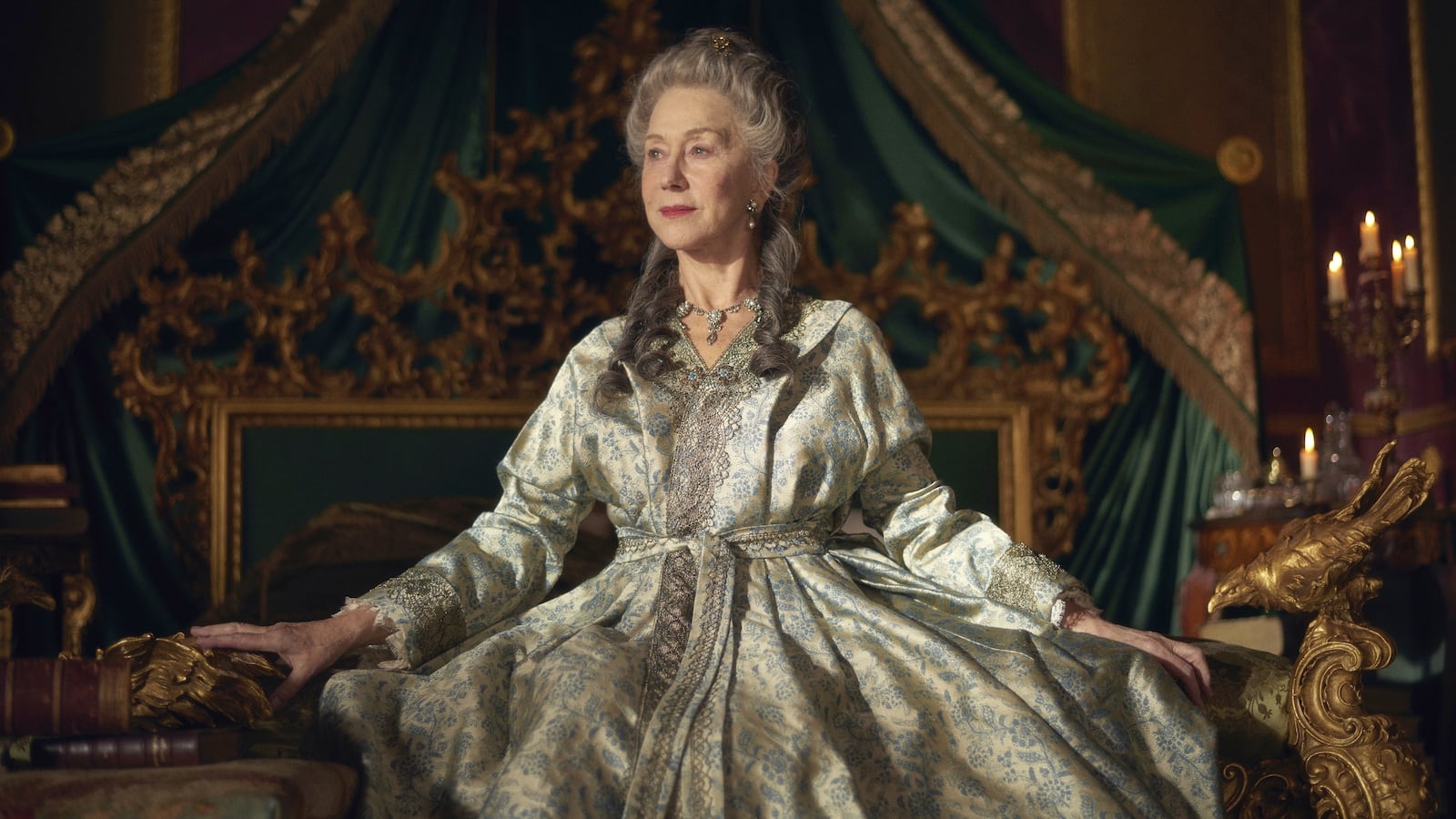Helen Mirren can do it all.
Here she is, at the age of 74, playing a woman half her age, in HBO’S Catherine the Great, and she is on fire—a woman seizing absolute power in a nest of male vipers, the Russian court of 1762.
Make no mistake: Nobody could better carry off the audacity of the casting. We’re so used to Woody Allen Syndrome—old male actors partnering with far younger women—that it’s a revelation to see the roles reversed as Mirren’s Catherine works her way through a series of muscular young lovers.
And this scenario raises another challenge to long-established sexual prejudices. After her death, Catherine was subjected by her successors to a smear campaign that has shown surprising stamina—that her life was one long banquet of inventive sex culminating in a scene where she dies attempting to mate with a horse.
That never happened. Catherine certainly had a healthy sex drive and, as we see in the opener of the HBO drama, she employed a kind of sexual food taster in the person of Countess Bruce who personally auditioned potential lovers—a role played with ribald enthusiasm by Gina McKee.
The traducing of Catherine’s life and reputation was based on one word: nymphomania. It’s extraordinary how damning that word could be, propelled along by Victorian ideas that a healthy sex drive was unseemly in a woman. Guess what? Queen Victoria herself had nine children in 17 years with Albert, her Prince Consort, and after he died she had a long fling with the groundkeeper of her Scottish estate.
To those who launched this campaign, Catherine’s whole reign was an offense against male supremacy, hence the backlash. She brought culture to a court that had been brutish and backward. Like her contemporary, Frederick the Great of Prussia, she conducted a long correspondence with the great sage of the Enlightenment, Voltaire. At the same time she had to outwit and outthink the Russian male power centers of the church, the military and the court.
I suspect that the HBO producers want to have it both ways with this mighty monarch—to tease us with the lascivious interludes and impress us with the commanding intellect. At one point early on, a courtier says “she eats men alive” and another responds “that sounds like an interesting proposition”—a conversation that sounds far too planted. This happens as Catherine declares that Russia badly needs change—the kind of change born of reason, not medieval repression.
As often happens in thickly-populated costume dramas, too much time is spent in the first episode of the four-parter on exposition. Nigel Williams, the writer, gets lost in his own undergrowth. In fact, there are parallels with that other HBO treatise on dark power, Succession—which also took time to get out of the weeds. Catherine knows that her son Paul is weak and pliable and already being talked of as a puppet to replace her, just like the debauched sons of Succession’s Logan Roy.
And the moral climate is much the same. Catherine is advised that “those in power must learn to be criminal.” I was worried for a while that I was watching another fiction that suddenly had shocking contemporary relevance but—apart from an inference that this story was all about making Russia great again—that fear soon disappeared as Mirren established herself as a mesmerizing presence.
As an actress she seems uniquely able to find some kind of inner contact with monarchs. Her Oscar-winning performance as Elizabeth II in the 2006 movie The Queen brought magically to life a woman who throughout a long reign has never seemed to want to be seen as a real person; consequently, Mirren’s version of the Queen became the template for the smash Netflix series, The Crown: a case of art actually bringing life to the inert.
Similarly, in The Madness of King George, Alan Bennett’s very human take on a deeply-troubled man, Mirren played the person known only in the royal bedchamber as “Mrs. King” with a combination of wit and tenderness.

From the pack of power-hungry plotters circling Catherine one emerges as the ultimate love of her life, her military mastermind Grigory Potemkin, played by Jason Clarke. It’s such a slow-burning bond that you forget the age difference in the actors (Clarke is 50). Catherine ruled for 34 years and was 67 when she died of a stroke; Potemkin died five years before her, at the age of 52.
Spoiler alert: once the story breaks loose from the claustrophobic choreography of the first part and allows space between the players it just keeps getting better and better, albeit because the locations in Lithuania, Latvia and Russia provide knockout doses of baroque excess. There are, however, times when Mirren’s winter wardrobe involves so much slinky fur that she could be on a catwalk in Paris or Milan, not directing an assault on the Ottoman Turks.
Catherine the Great seems part of an accidental alliance of dramas that are subverting the old order of sexual power plays. There was the movie The Favourite, the 18th century romp in which a lesbian triangle centered on Queen Anne seize control of England’s destiny, and HBO’s Gentleman Jack, the true story of Anne Lister, an openly-gay landowner competing with the male hierarchies of Victorian England.
Like the homophobia of that time, nymphomania was a pejorative promoted by men who were quite happy themselves to be described as horny. That, too, will be buried as an anachronism by the overdue revisionism of Catherine the Great and the equally great actress who so compellingly plays her.


